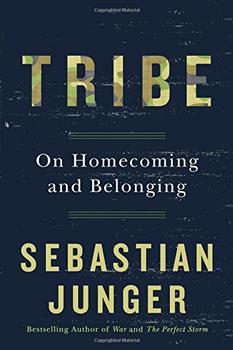Summary | Excerpt | Reviews | Beyond the Book | Read-Alikes | Genres & Themes | Author Bio

On Homecoming and Belonging
by Sebastian JungerThis article relates to Tribe
Africa's Kalahari desert might seem an unlikely model for American society. But the Kalahari—a sparsely populated swath of sun-baked bushland that boasts temperatures regularly above 100 degrees during the day and just a few inches of rainfall every year—is home to a tribe of nomadic people called the Kung (part of the San people, also known as Bushmen). In Tribe, Sebastian Junger celebrates the virtues of the Kung people, suggesting their tribal ways might just hold the solution to our modern American sense of isolation and emptiness.
"The relatively relaxed pace of Kung life—even during times of adversity—challenged long-standing ideas that modern society created a surplus of leisure time. It created exactly the opposite: a desperate cycle of work, financial obligation, and more work. The Kung had far fewer belongings than Westerners, but their lives were under much greater personal control," Junger notes.
 The Kung, despite scarce resources and frequent relocations (made necessary by their constant foraging for food across the vast Kalahari), exhibit little stress or infighting, and are "utterly intolerant of hoarding or selfishness." In what many would recognize as a remarkable degree of democratic rule, no member of the Kung tribe (or any of the many subdivisions of the larger Kung people, "communities" of 30-50 tribal members), has more power or authority over any other member. There are no elected leaders, and men and women share most of the hunting, gathering, and even child-rearing. Although tribal elders often dispense advice at tribal councils, no one in the tribe is subject to anyone else's dictates.
The Kung, despite scarce resources and frequent relocations (made necessary by their constant foraging for food across the vast Kalahari), exhibit little stress or infighting, and are "utterly intolerant of hoarding or selfishness." In what many would recognize as a remarkable degree of democratic rule, no member of the Kung tribe (or any of the many subdivisions of the larger Kung people, "communities" of 30-50 tribal members), has more power or authority over any other member. There are no elected leaders, and men and women share most of the hunting, gathering, and even child-rearing. Although tribal elders often dispense advice at tribal councils, no one in the tribe is subject to anyone else's dictates.
As a website dedicated to disseminating information about the Kung points out, "Sharing is an important part of their culture, and working as a team is an essential part of coping with their surroundings. They discuss all problems democratically, as a group...keeping peace and unity is an important part of everyday living."
If the Kung people seem vaguely familiar, it might be you are recalling the 1980 film The Gods Must Be Crazy, an award-winning South African movie that featured a Kung-like bushman in comic interplay with the modern world. But there is nothing terribly comic about the Kung—in fact, their way of life is being severely threatened by the encroachment of the modern world. In his study of the tribe, Bush for the Bushman, John Perrott argues that the future for the Kung—who have roamed the Kalahari for tens of thousands of years—is extremely fraught: "If the situation of hunter-gatherer peoples worldwide is any indication, it may be naïve at this late date to try to do anything for them. What has happened to the American Plains Indian, the Inuit, Tasmanian Man, and most of the Australian Aborigines outside the Northern Territory would not auger well for a happy ending."
Picture of Kung tribesman from The !Kung and Other Cultural Anthropology
Filed under Places, Cultures & Identities
![]() This article relates to Tribe.
It first ran in the February 1, 2017
issue of BookBrowse Recommends.
This article relates to Tribe.
It first ran in the February 1, 2017
issue of BookBrowse Recommends.
Your guide toexceptional books
BookBrowse seeks out and recommends the best in contemporary fiction and nonfiction—books that not only engage and entertain but also deepen our understanding of ourselves and the world around us.